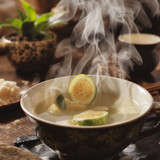

Starwest Botanicals
Organic White Tea Bags
White Tea Bags vs. Green Tea: Why They’re Different White tea and green tea come from the same plant—Camellia sinensis—but they’re made differently. That difference in processing is why white tea...
Balloon Flower Root (Jie Geng) is a traditional Chinese herb used to support lung health, soothe sore throat, relieve cough, and expel phlegm. Ideal for respiratory care.
Balloon Flower Root, known as Jie Geng in Traditional Chinese Medicine, is a trusted herbal remedy used to open the lungs, expel phlegm, and ease sore throat and cough. With its upward-directing energy, it’s often included in formulas for chest congestion, hoarseness, and respiratory imbalance. Gentle yet effective, Jie Geng is ideal for those seeking natural support for lung and throat health.
Our premium-quality Balloon Flower Root is lab-tested, sustainably sourced, and available in dried, powdered, and encapsulated forms—perfect for teas, decoctions, or daily respiratory support.

| Health Benefit | Why It Works | When to Use It |
|---|---|---|
| Respiratory Support | Contains saponins and polysaccharides with expectorant properties that help loosen and expel phlegm. Opens Lung Qi to relieve chest congestion. | Benefits: wet cough, bronchitis, sore throat, hoarseness, or during the early stages of a cold. |
| Throat Soothing | Jie Geng's upward action guides herbs and Lung Qi to the throat, relieving pain and inflammation. | Benefits: sore throat, laryngitis, voice loss, or dry, scratchy throat. |
| Anti-inflammatory | Contains platycodin compounds shown to reduce inflammation and oxidative stress in both respiratory and systemic conditions. | Aids in: arthritis, inflamed sinuses, or general inflammatory responses. |
| Immune Support | Polysaccharides in Jie Geng stimulate immune function, enhancing the body’s resistance to infections. | Support for low immunity, frequent colds, or as a preventative during cold and flu season. |
| Digestive Aid | Traditionally used to stimulate appetite and relieve bloating. May help regulate digestive enzymes and motility. | Provides temporary relief for mild indigestion, stomach discomfort, or poor appetite. |
| Expels Pus & Phlegm | Jie Geng clears phlegm and pus, especially from the upper body, and disseminates Lung Qi upward to open passages. | Benefit for abscesses, yellow sputum, thick mucus, or chest fullness due to phlegm accumulation. |

Balloon flower, also known as Platycodon grandiflorus, is a plant native to East Asia and is renowned for its medicinal properties.
Common Name: Balloon Flower, Platycodon Root, Balloon flower Root, Bellflower, Bellflower Root
Botanical Name: Platycodon grandiflorum; Radix
Pin Yin Name: Jie Geng
Balloon Flower Root Precautions: Do not use if pregnant or nursing. Contraindicated in those with chronic cough from Yin Deficiency.
How to Use Balloon Flower:
Tea: You can prepare balloon flower tea by steeping dried balloon flower roots or petals in hot water. This tea can be consumed to promote respiratory health or alleviate inflammation.
Tincture: Balloon flower tinctures are also available and can be taken orally for medicinal purposes.
Powder: Balloon flower root powder can be incorporated into herbal formulations or used to make capsules.
Balloon Flower Root Properties: Bitter, Acrid, Neutral
Balloon Flower Root Channels / Meridians: Lungs, Stomach
Balloon Flower Root Naturally Occurring Components: platycodin, deapioplatycodin, 2-O-acetylplatycodin, 3-O-acetylplatycodin, platycodigenin, polygalacic acid, methyl 3-O-β-D-glucpyranosyl polygalacate, methyl 3-O-β-laminaribiosyl polygalacat
Cautions:
Ginger: Balloon flower and ginger both possess anti-inflammatory properties and can complement each other in teas or tinctures aimed at reducing inflammation.
Licorice: Combining balloon flower with licorice root may enhance its expectorant properties and provide additional respiratory support.
Echinacea: Echinacea is another herb known for its immune-boosting properties and can be combined with balloon flower to support overall immune function.
Noteworthy Information On Balloon Flower Root
Traditional Medicinal Uses: Balloon flower root has been used for centuries in traditional East Asian medicine, particularly in Korean, Chinese, and Japanese herbal practices. It is prized for its medicinal properties, which include treating respiratory ailments such as coughs, colds, and bronchitis. The root is often prepared as a tea or tincture to alleviate respiratory discomfort and promote lung health.
Culinary Delicacy: In addition to its medicinal uses, balloon flower root is also consumed as a culinary delicacy in some East Asian cuisines, particularly in Korean cuisine. The root, known as doraji (도라지) in Korean, is often used in salads, stir-fries, and soups. It has a slightly sweet and crunchy texture, making it a versatile ingredient in various dishes.
Unique Flowering Pattern: The name "balloon flower" is derived from the unique shape of its flower buds, which resemble small, inflated balloons before they bloom. As the buds mature, they gradually open into star-shaped flowers in hues of blue, purple, pink, or white, depending on the variety. This distinctive flowering pattern adds ornamental value to gardens and landscapes, making balloon flower a popular choice among gardeners and flower enthusiasts.
References
alternativehealing.org
https://herbpathy.com/Uses-and-Benefits-of-Jie-Geng-Cid2557
https://pmc.ncbi.nlm.nih.gov/articles/PMC6977515/
https://www.ncbi.nlm.nih.gov/pmc/articles/PMC7073691/
https://www.mdpi.com/2076-3921/12/2/327
https://www.mansfieldnewsjournal.com/story/news/2021/10/26/stroll-through-garden-glowing-healthy-balloon-flower/6171884001/